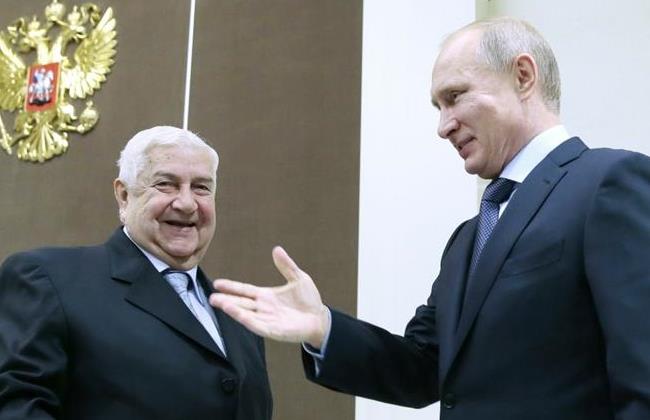Putin lends unwavering support for Assad’s war
Agencies/Daily Star/Nov. 27, 2014
MOSCOW/SOCHI: Russia said Wednesday it would support President Bashar Assad to combat “terrorism” in the Middle East, indicating there was no new room for compromise on one of the key contentious issues in the Syrian conflict.
Russian President Vladimir Putin and Foreign Minister Sergey Lavrov held talks with Assad’s foreign minister, Walid al-Moallem, on the Black Sea as part of Moscow’s renewed diplomatic push to restart peace talks on Syria.
“We share the view that the main factor driving the situation in the Middle East is the terrorist threat,” Lavrov told a joint news conference with Moallem. “Russia will continue supporting Syria … in countering this threat.”
Russia has been the key ally of Assad in the conflict, which is in its fourth year and where the situation on the ground has deteriorated as ISIS, an Al-Qaeda offshoot, has grabbed large swaths of land.
The last round of talks between Damascus and the opposition collapsed in February over rifts over Assad’s role in any transition out of the conflict. The main Syrian opposition in exile and its Western and Arab backers want him to go.
But Moscow says advances made by Islamic hard-liners mean fighting “terrorism” should be the top priority for all “healthy” forces now, and that that is not possible without cooperating with Assad.
Lavrov criticized the United States for refusing to do that.
Moallem told the news conference his meeting with Putin was “very productive” and that the Russian president confirmed his resolve to develop ties with Damascus and Assad.
“The meeting was devoted to Russian-Syrian relations,” the Kremlin said in a two-sentence statement issued after Moallem’s visit to Putin’s Black Sea retreat in Sochi.
Russian news agencies quoted Moallem as saying only that the meeting was “very productive.”
Moallem also said he and Lavrov had discussed Moscow’s proposal to host peace talks on Syria and that they agreed to continue discussing this. Lavrov said bringing together Damascus and the opposition was difficult and required more time.It is not clear who would represent the opposition if any such talks are held.
While the West and Arab countries seeking Assad’s exit support the Turkey-based National Coalition for Syrian Revolutionary and Opposition Forces, Russia says the exiled organization is just one opposition group and has no real influence on what is happening on the ground.
Lavrov said any talks should include “a wide range of social and political forces.”
Two previous rounds of Syria peace negotiations in Geneva in June 2012 and last January ended in failure and no new meetings in Switzerland are currently being planned.
Russian news reports quoted Lavrov as saying after the meeting that no new Geneva talks were possible at this time.
But he fell short of formally offering Moscow as the venue for future contacts. “If you think that a conference will be announced similar to the one that was held in … January this year with the participation of 50-odd states, thousands of journalists, bright lights, there won’t be such a conference,” Interfax quoted Lavrov as saying.
“Considering the conflicts that have built up over recent years, considering the persistent attempts at external interference in the Syrian conflict, it is clear that [preparations for direct negotiations] are far from simple and will need time.”
The Syrian foreign minister was quoted earlier this month in Lebanon’s Al-Akhbar newspaper as saying that he would raise the issue of Russia’s stalled shipment of sophisticated S-300 missiles to protect Syrian forces from possible U.S. airstrikes.
Russia – now embroiled in a major diplomatic row with the West over Ukraine – suspended their delivery in 2013 under pressure from Israel and the United States.
Lavrov was quoted only as saying that “Russia will continue helping Syria protect itself against terrorism.”
Syrian rebel leaders have paid a series of brief visits to Moscow that only highlighted stark differences between the two sides.




















